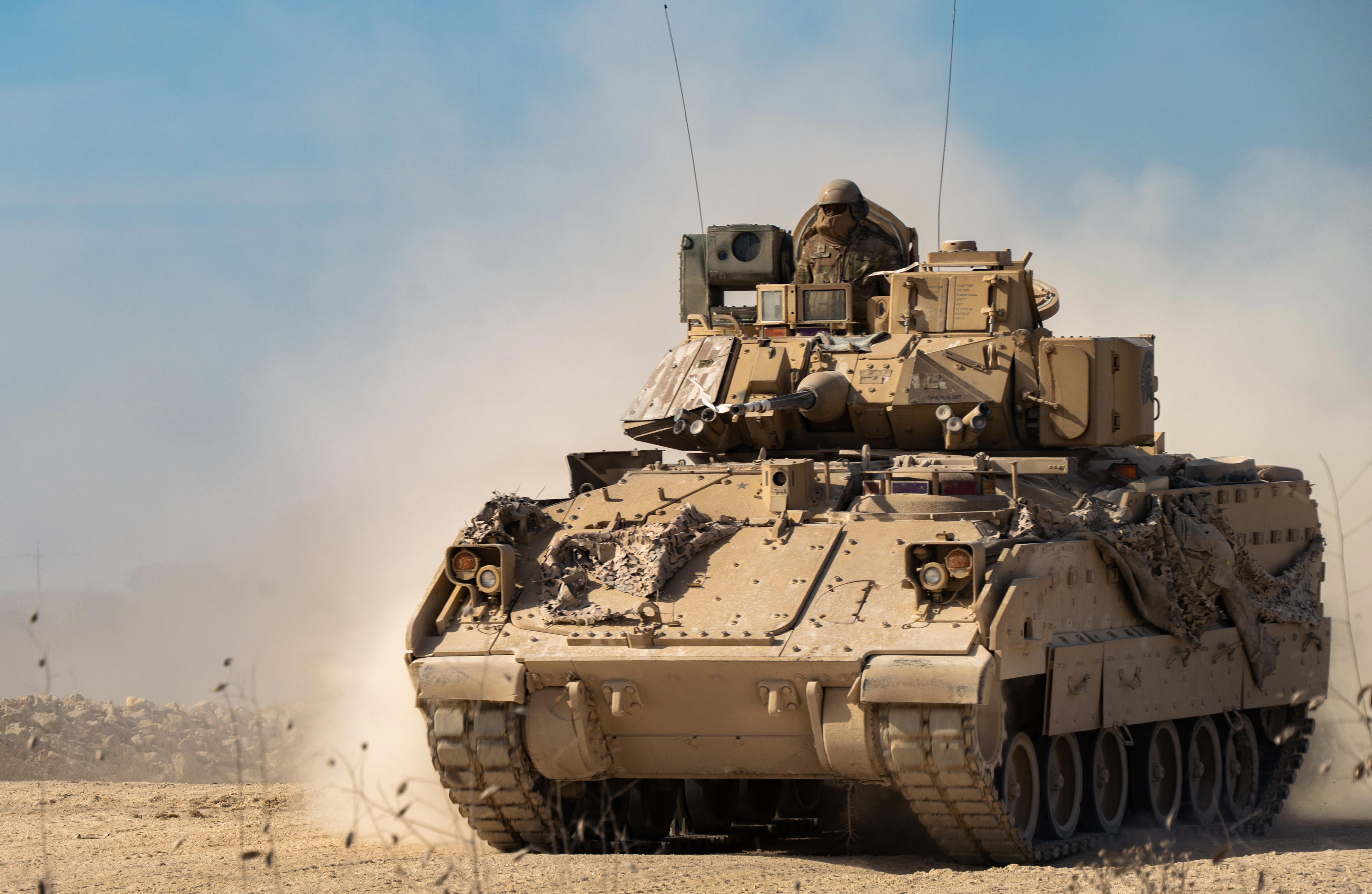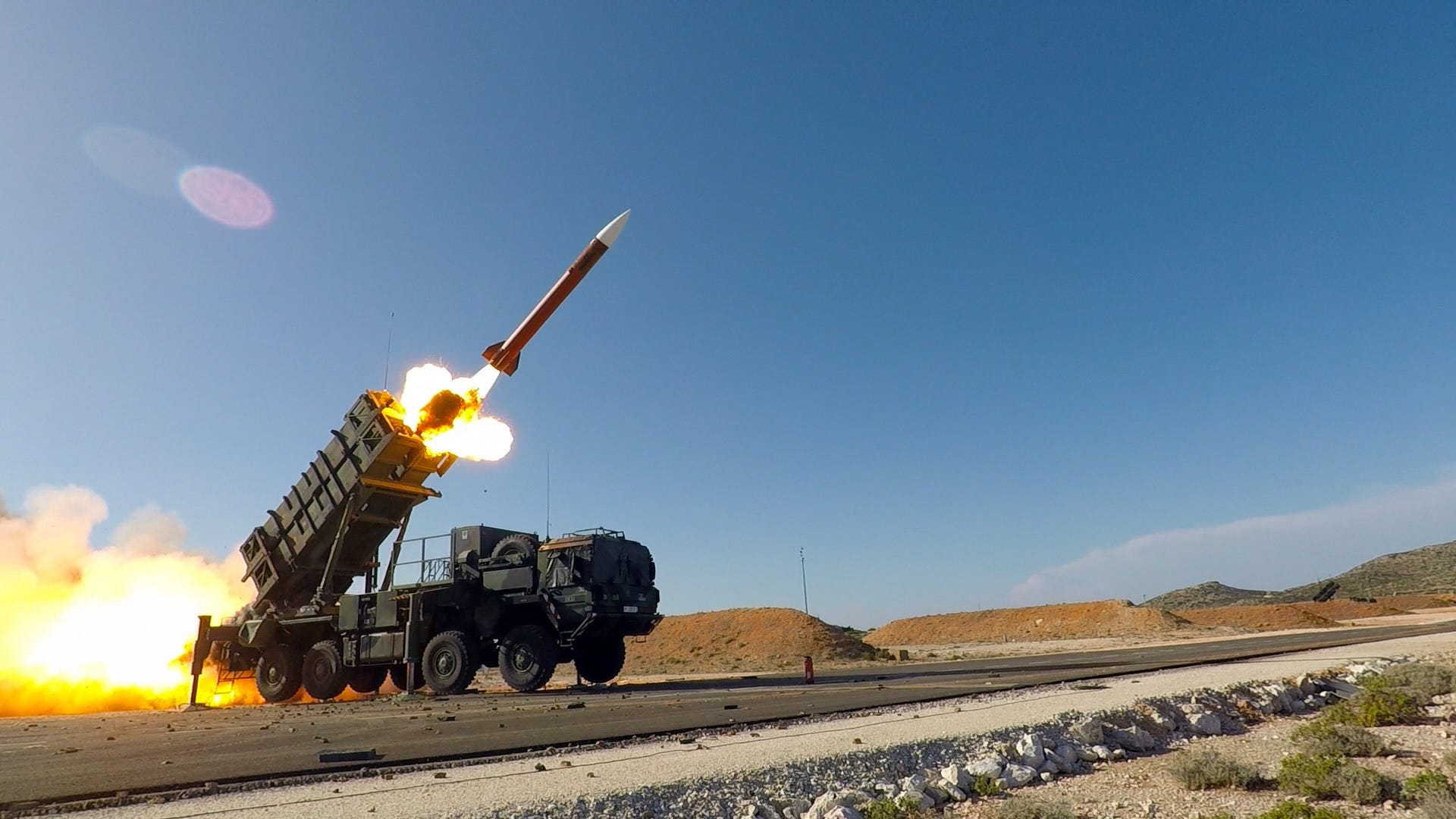
A M2 Bradley Infantry Fighting Vehicle drives during a live fire exercise at Fort Cavazos, Texas, on Jan. 20. Spc. David Dumas/US Army
- The days of rapid tank and infantry advances deep into an enemy’s territory may be over.
- The US Army must be prepared more for fights that resemble WWI, an Army veteran argues.
- Any advancing force must move with a defensive bubble against enemy firepower, he argued.
Modern weapons have become so accurate and lethal that soon armies will not be able to maneuver rapidly on the battlefield.
Instead, they will trudge forward under the protection of defensive “bubbles” designed to stop drones and missiles. According to this vision, swift battlefield maneuvers will be replaced by grinding wars of attrition where victory goes to the side that has the most firepower as well as the most resources to replace losses.
It’s a grim vision of warfare that has more in common with the slaughter of the First World War than the mechanized blitzkriegs of World War II and Desert Storm, where infantry and armor backed by airpower seized vast territory. But it’s a future the West must prepare for, warns Alex Vershinin, a retired US Army lieutenant colonel, in an essay for Britain’s Royal United Services Institute think tank.
The Ukraine war has demonstrated that — at least for now — firepower dominates maneuver. Russian and Ukrainian have painfully learned that with surveillance and attack drones constantly overhead, emerging from cover is dangerous and slow. Long-range guided missiles and shells can decimate armored columns that dare to thrust through minefields and layered defenses covered by artillery and airpower. Instead of sweeping offensives, the Ukraine war has become a largely static conflict where immense preparations are made for attacks that might gain an obscure village or a few square miles of territory before the attacker halts to dig in and regroup.
“It is easier to mass fires than forces,” Vershinin said in the RUSI analysis. “Deep maneuver, which requires the massing of combat power, is no longer possible because any massed force will be destroyed by indirect fires before it can achieve success in depth. Instead, a ground offensive requires a tight protective bubble to ward off enemy strike systems.”
“Shallow attacks along the forward line of troops are most likely to be successful at an acceptable cost ratio; attempts at deep penetration will be exposed to massed fires the moment they exit the protection of the defensive bubble,” said Vershinin.

The Patriot air defense system was test-fired during a 2017 training in Greece. Anthony Sweeney/US Army
This moving shield would consist of layers of defense systems, including air defense against drones and missiles, as well as electronic warfare to jam those drones and missiles by flooding their control frequencies with electronic noise. But this protection comes at the cost of rapid maneuver. That bubble must be carefully set up to provide interlocking coverage against multiple types of threats, and move in lockstep with the column.
“Moving numerous interdependent systems is highly complicated and unlikely to be successful,” Vershinin said.
Coordinating all these different weapons and jammers also requires skilled staff work that even advanced armies may lack. “Integration of these overlapping assets requires centralized planning and exceptionally well-trained staff officers, capable of integrating multiple capabilities on the fly,” said Vershinin. “It takes years to train such officers, and even combat experience does not generate such skills in a short time.”
As an example, Vershinin cites a hypothetical advance by a platoon of 30 soldiers. This would require multiple jammers to disrupt enemy drones, guided rockets, and communication systems. Engineers will have to clear a path through any minefields, and the infantry will have to coordinate with friendly artillery and drones. Failure to do this could be catastrophic: Russia is now firing 10,000 artillery shells per day, and this year it has already dropped 3,500 big GPS-guided glide bombs that have devastated Ukrainian positions.
“All these systems need to work as an integrated team just to support 30 men in several vehicles attacking another 30 men or less,” Vershinin said. The preparations needed for a brigade- or division-sized attack — the kind that are needed to achieve decisive victories on the battlefield — can only be imagined.
All of this raises a deeper problem, especially for the West. Without maneuver, war becomes a battle of attrition, like the First World War, or siege warfare as with the Union and Confederate armies in front of Richmond in 1864. These kinds of wars are fought over years and cause slaughter on a massive scale.
“The West is not prepared for this kind of war,” Vershinin said. “To most Western experts, attritional strategy is counterintuitive. Historically, the West preferred the short ‘winner takes all’ clash of professional armies.”
To some extent, all wars are attritional: what ultimately destroyed the Third Reich wasn’t a few defeats like Stalingrad and Normandy, but the cumulative losses from six years of relentless fighting. However, sustaining a war of attrition requires an emphasis on production, mobilizing resources for the long haul, and the ability to continuously replace losses. Victory goes to the side that can wear down the enemy while maintaining its own strength.
“The military conduct of war is driven by overall political strategic objectives, military realities and economic limitations,” said Vershinin. “Combat operations are shallow and focus on destroying enemy resources, not on gaining terrain.”
One question is whether the Western public will tolerate this mode of warfare. Vladimir Putin and his generals may not lose any sleep over suffering nearly 500,000 casualties in two years. But the average American or European may feel differently.
Michael Peck is a defense writer whose work has appeared in Forbes, Defense News, Foreign Policy magazine, and other publications. He holds an MA in political science from Rutgers Univ. Follow him on Twitter and LinkedIn.
If you enjoyed this story, be sure to follow Business Insider on Microsoft Start.
News Related-
Antoine Dupont still hurt by 'injustice' of World Cup loss to Springboks
-
China's New Aircraft Carrier Begins Catapult Testing
-
Aircraft Downed Inside Russia By Patriot System: Ukrainian Air Force
-
“Am I Prog’s Taylor Swift? That’s a debate that could run and run”: why Peter Hammill re-recorded his Enigma-era albums
-
Car With Pro-Russian Fighters Blown Up by Resistance: Exiled Mayor
-
Europe and African nations must find effective common ground in dealing with migration influx
-
Springbok lock opts not to renew contract with URC team
-
Pravin Gordhan’s deathly legacy: A threat to SA’s economic future
-
Antoine Dupont STILL hurt by ‘injustice’ of Rugby World Cup loss to Springboks
-
Rubber stamping NHI Bill will have damaging consequences for SA for generations
-
Inside horrific conditions Hamas hostages suffered including losing 15lbs in 50 days
-
After the Bell: SA’s NHI healthcare disaster starts right here
-
Gupta-linked development land for sale
-
Gary Neville begrudgingly claims brilliant Man Utd midfielder ‘looked like a Man City player’ in Everton mauling
